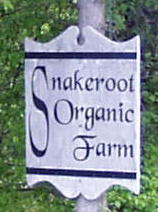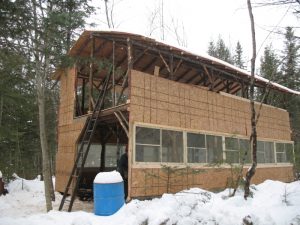|
|
|
| Dear *|FNAME|*,
As most farmers and gardeners know, 2009 was one of the worst seasons in decades for production of heat-loving plants, and, due to late blight, for potatoes and tomatoes especially. Not only did the sun barely come out at all for seven weeks in June & July, but the weeds got a reprieve from being hoed, cultivated, or hand weeded because the soil was just too wet. Our insurance policy against such poor growing seasons is called “diversity”, because what is bad weather for one crop can be good weather for another. So although we had poor crops of grapes, potatoes, tomatoes, cherry tomatoes, cucumbers and summer squash, this year was, in fact, a bumper year for us for broccoli, onions, garlic, shallots, leeks, winter squash and carrots. As a result, sales for 2009 were about the same as for 2008. And of course the grass grew like crazy, so we were able to mow plenty of it for mulch. Probably the biggest news for us this year was losing Jack and Coco, who had been with us since 2006. During that time they had become and intregral part of the farm, taking on more and more of the farming responsibilities. However beginning in late spring they seemed increasingly dissatisfied with being here, so instead of completely taking over our operation, they decided to leave at the end of August. Needless to say this was difficult for us both operationally and emotionally, but with the help of some of our long time hourly workers, we managed to complete the season with hardly a hitch, altho we did have to stop attending the Newport market a few weeks early. How effective is our CSA in the running of our farm? In 2009 we had 82 CSA members who bought a total of 112.3 shares. This means we had $11,230 to help finance the year’s startup costs, and for that members Our way of doing a CSA, often called a “debit system”, is catching on with many farms who are already doing direct-to-the-public sales, because it integrates so easily with what they are currently doing. The CSA debit system also enables us to allow our CSA members to purchase items we don’t grow from other stalls at market. Just tell them Snakeroot will pay for it, then come back to tell us how much to deduct from your account and who we should pay. (Don’t forget this part!) As a result you can use your In November and December we added several new pages to our website, We’ve purchased a conduit bender from Johnny’s Selected Seeds for making large hoops that will cover our early season and late season crops. This should enable us to produce more fall broccoli and spinach and more spring greens and radishes. We’ll cover the hoops with recycled greenhouse plastic held in place with sand bags. This newsletter format is brand new for us. We’d like to hear how you enjoyed it, or if you had any difficulties with it. We’ll try to do several of these a year, but it might be hard to find time during the summer months. In any case, we’re considering reducing the number of paper copies we send out of our annual CSA invitation and CSA brochure, and this newsletter would be the replacement. Of course we’ll be sending paper copies to all whose email addresses we don’t have, but if you are getting this you will not be getting our usual paper invitation UNLESS YOU ASK US TO SEND A PAPER COPY. Our CSA Brochure with its signup form is available to download from our website in PDF format for printing out. You may download it now. See everyone at market. |
We will also be growing several pots of okra in a greenhouse along with our hot peppers. Both should be ready by mid August, so dig out your gumbo recipes. Our cooler is currently full of carrots, parsnips, celeriac and rutabagas being stored for spring market sales. We expect to have these overwintered crops at market in April and well into May. Starting at the Orono and Waterville markets in April we will also be offering spring-dug parsnips and sunchokes as well as spring grown spinach, lettuce radishes, and spicy greens from our greenhouse beds. Most of these should last into the A new CSA phenomenon that we are beginning to notice is that folks are giving CSA sub- scriptions as holiday gifts or Barrels Community Market on Main Street in Waterville is placing regular orders with us this winter for carrots, celeriac, parsnips and rutabagas. So if you can’t wait until the April markets begin and you can’t to come out to the farm, you can find some of our produce at Barrels. As of this writing it is not clear to us how we will be able to attend the Newport Farmers’ and Artisans’
|
|
MOFGA Certified Organic vegetables, herbs, seeds, seedlings & perennials since 1995. Snakeroot Organic Farm, 27 Organic Farm Rd., Pittsfield, Maine 04967 ph 487-5056 |
|
Snakeroot Organic Farm
Gardeners to the public since 1995.
LOGIN
 This website is licensed under a
This website is licensed under a
Creative Commons Attribution-ShareAlike 3.0 Unported License.
PageSpeed WordPress theme by SwiftThemes.Com


